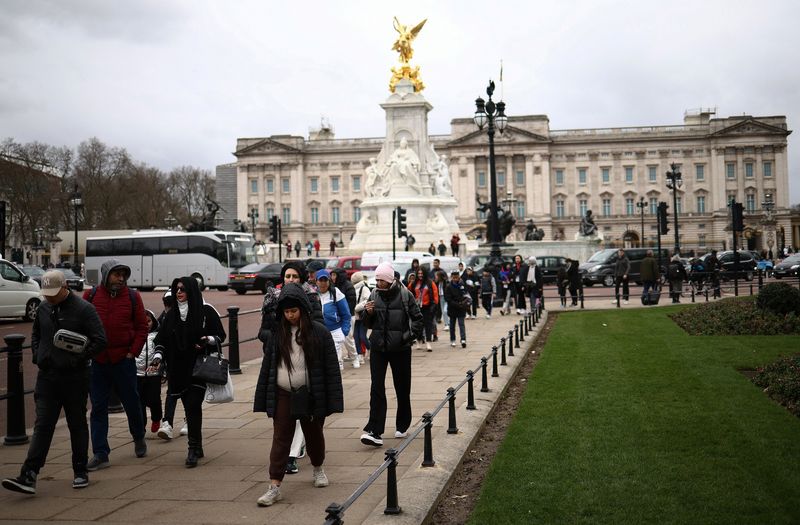By John Revill, Rachel More and Joanna Plucinska
ZURICH/BERLIN/LONDON (Reuters) - Urs Kessler, who runs Jungfrau Railways, a train that takes tourists up the highest mountain in Switzerland, was excited for the return of Chinese tourists after COVID-19 restrictions were lifted late last year.
But barring one small group in February and a few larger ones expected in May, few have materialised.
Many tour operators like Kessler are disappointed by lower-than-expected bookings from high-spending Chinese travellers who before the pandemic would typically splash between 1,500 and 3,000 euros per person, according to the Global Times newspaper.
Chinese outbound flight bookings to Europe during March and August are only 32% that of pre-pandemic levels, according to travel data firm ForwardKeys.
The travel industry is also grappling with cash-strapped domestic holidaymakers looking for cheaper vacations as energy and food bills rise. This summer, the second since Europe's COVID restrictions ended, is a test for airports and airlines, scrambling to hire staff and avoid a repeat of last summer's chaos.
"There's still a long way to go to full recovery," said Olivier Ponti, an executive at ForwardKeys.
"Chinese airlines are doing anything, everything they can to … operate those routes. But, you need the staff, you need the slots, you need the right level of service."
Kessler, who ran a marketing campaign featuring pianist Lang Lang playing on top of the mountain to pander to the Chinese audience, is hoping groups from countries like the United States, South Korea and India will make up the shortfall.
Before the pandemic, Chinese tourism made up 10% of stays from non-EU tourists in Europe, with the market growing 350% in the decade to 2019, driven by a particular interest in luxury shopping and fine dining.
But bogged down by visa restrictions, long passport wait lines and limited airline tickets to Europe, which are in some cases 80% more expensive than before the pandemic, Chinese tourists are staying closer to home.
Instead, they're taking their hard-earned pandemic savings to places like Hong Kong, where arrivals were up 1,400% in the last two months, or Thailand and Macau.
For the less wealthy, the price of getting to Europe is also a deterrent.
"Cost is definitely part of the consideration. A lot of flights haven't opened up yet - that makes it harder to look at going to Europe soon - but we would love to travel outside of China more," Shanghai-based Stephanie Lin, 33, told Reuters.
BRING IN THE AMERICANS
Tour operators are looking to Americans, who, bolstered by a strong dollar, are coming to Europe in droves. Some analysts predict transatlantic travel to places like London and Paris could surpass 2019 levels.
Sophie Lu, 26, came to London in early March from Hawaii and was pleasantly surprised by how affordable the food was.
"I was not planning on splurging whatsoever, but when I got here I kind of just noticed that there are a lot of things that America doesn't have and it's a little cheaper from where I'm living," she said, standing in front of the gates of Buckingham Palace.
On the Champs-Elysee in Paris, Colleen Danielson, 40, who was visiting from Boston, said she was also more keen to spend because of the dollar's strength.
"When we were in Dior, we were thinking should we make a bigger purchase, a bag or something like that. The exchange rate does have an impact," she said.
OPTIMISM FOR THE FUTURE
Many tourist operators and retailers hope the second half will bring a relaxation in visa policies, more flights and the long-expected influx of Chinese tourists.
Retailers banking on a gradual return are already running flashy marketing campaigns.
Harrods launched branded stickers, including its iconic teddy bear, on China's popular WeChat messaging platform this year to attract Chinese tourists.
Bicester Village, a discount designer retail outlet near Oxford, is also using WeChat to facilitate shopping trip planning and Chinese payment options.

Kessler believes his Lang Lang campaign was still worth it.
"I think it will go a little bit like an ice hockey stick," he said. "The start of the year will be flat, but then pick up as we go through the year."